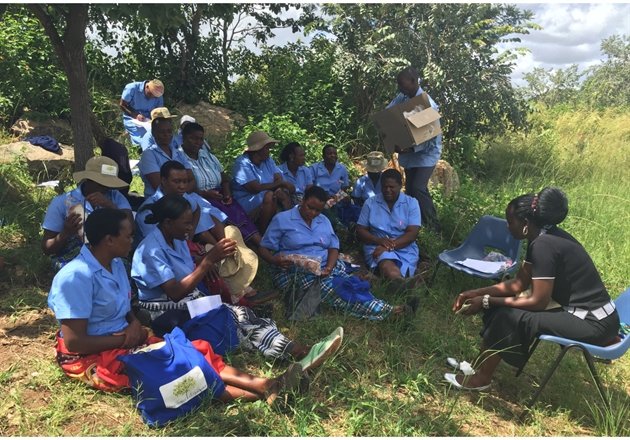By Claire Morris and Natalie Stewart | Source: E-hospice
As the political and social challenges in Zimbabwe are reported across the world, Claire Morris and Natalie Stewart highlight their experiences of remarkable community resilience and spirit in the face of immense difficulties in the Goromonzi district of Zimbabwe.
In April 2016, we travelled to Zimbabwe for a monitoring visit by Hospice UK on the Big Lottery funded project led in-country by Island Hospice and Healthcare Service.
The COLLABORATE: Zimbabwe HIV Care Project is a joint initiative which aims to provide support and improve the quality of life for people living with and affected by HIV in Zimbabwe.
What is the COLLABORATE Project?
The COLLABORATE project was designed based on a comprehensive situation analysis which highlighted an overwhelming need for palliative care service provision in the Goromonzi district of Zimbabwe.The core set of activities include: delivering HIV palliative care; provision of psychosocial support to bereaved and affected children; workshops for young carers; Internal Savings and Lending Schemes; the strengthening of community health centre committees; advocacy and mentorship to improve availability of the palliative care medications at district and community level; and to share learning.
The project centres on the idea of collaboration between different NGO, community and government partners, strengthening and supporting community resilience and building capacity to provide palliative care.
What has been achieved?
The success of the project was clear. We visited all the sites across Goromonzi, and met with community caregivers, people living with HIV, healthcare providers and young carers.
Positive experiences of the project were reiterated repeatedly, and the respect for the professionalism, skills and compassion of the Island Hospice staff was remarkable.
A key success has been building a strong cadre of caregivers who are bridging the gaps between communities and health facilities to provide comprehensive care.
The project has seen morphine being dispensed for the first time in the Makumbe hospital, enabling people to access this critical pain relief and tackling the fears of health professionals to stock and prescribe.
These are some of the things we heard:
What are the challenges?
Food
With Zimbabwe experiencing its second drought in two years, one of the major challenges is the lack of food. We saw patches of maize, the staple diet of most Zimbabweans, which were wilting, bare and dying, when they should have been large, ripe and ready to harvest. While communities were able to get through one year on food stores, the fear following this second drought is palpable and real. Solutions are not forthcoming.
Lack of medications
The supply chain for medications is complex. From community health centres to the district hospitals, medications are in short supply if not funded by external bodies (like ARVs). There has been significant success in getting morphine to be stocked and dispensed from the district hospital in Makumbe. However, there are profound challenges in influencing the national system to ensure availability of medications across communities.
Distance and transport
We witnessed first-hand the long distances caregivers have to travel to reach their patients and the health centres. Patients who need to go to healthcare centres or the district hospital face huge distances and costly transport, which will often be completely unaffordable.
Poverty
While the exact figures for unemployment in Zimbabwe are unclear and complicated by work in the informal sector, some have estimated that it may be as high as 95%. The poverty in Zimbabwe is acute. Some health centres now charge nominal fees for consultations, a situation which may make access to care prohibitive for many in the population.
Management of acute pain
The combination of the issue of access to medications alongside the distance to the district hospital creates challenges in patients with acute pain.
Island is doing a tremendous job in increasing access to morphine and building the skills and knowledge of caregivers and health providers to identify, refer and treat pain.
While the skills will remain at the end of the project, concern remains around availability and accessibility of medications for pain, particularly when people are unable to travel.
What we learnt
Community resilience and compassion
Compassion exists within us and within our communities. It is latent and present from the moment our mothers hold us when we are born.
It is an asset which we can use, nurture and develop to benefit ourselves and those in our communities. Goromonzi showed an excellent example of what the term ‘compassionate communities’ actually means.
The communities we visited showed great resilience in the face of enormous challenges. The positivity, commitment, passion and energy, particularly of the community caregivers, is remarkable.
Dedication and expertise
The profound respect and gratitude for staff at Island was heard everywhere we went. From the support groups, to the district officials, to the hospital healthcare professionals to the community leaders.
The care that Island provide is fantastic; developed to be sustainable and supportive, building on community assets and focusing on collaboration and meaningful partnerships.
A final note
Island Hospice and Healthcare Service – you rock. Thank you for being a fantastic partner to Hospice UK and the fabulous work you do to alleviate pain and suffering in Zimbabwe.
And we are grateful to the community caregivers, who are on the ground, day after day, providing care and support to people in the most difficult situations.
Without these amazing men and women, this project, and the successes it has seen so far, would not exist.
Links:
Project reports on GlobalGiving are posted directly to globalgiving.org by Project Leaders as they are completed, generally every 3-4 months. To protect the integrity of these documents, GlobalGiving does not alter them; therefore you may find some language or formatting issues.
If you donate to this project or have donated to this project, you can receive an email when this project posts a report. You can also subscribe for reports without donating.
Support this important cause by creating a personalized fundraising page.
Start a Fundraiser